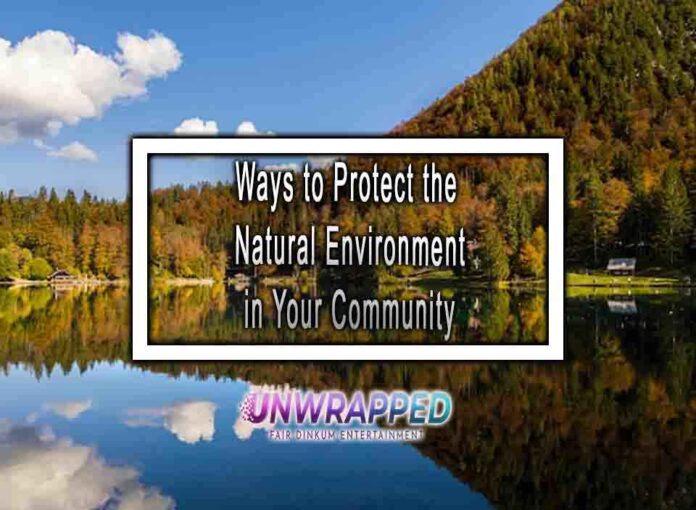Protecting the natural environment in your community is crucial for the well-being of both local ecosystems and residents. Here are various ways you can contribute to environmental conservation in your community:
Reduce, Reuse, Recycle:
- Minimize waste by recycling materials like paper, glass, plastic, and metal.
- Reuse items whenever possible to reduce the demand for new products.
Conserve Water:
- Fix leaks in faucets and pipes.
- Use water-saving appliances and fixtures.
- Water plants early in the morning or late in the evening to reduce evaporation.

Energy Conservation:
- Opt for energy-efficient appliances and light bulbs.
- Turn off lights and electronics when not in use.
- Use renewable energy sources when possible.
Plant Trees and Native Plants:
- Participate in local tree-planting events.
- Choose native plants for your garden, as they require less water and provide essential habitats for local wildlife.
Wildlife Conservation:
- Protect natural habitats by not disturbing nesting areas and avoiding removal of plants.
- Support local wildlife conservation initiatives and rehabilitation centers.
Community Clean-Up Events:
- Organize or participate in community clean-up events to remove litter from public spaces and water bodies.
- Encourage proper waste disposal and discourage littering.
Environmental Education:
- Educate others about the importance of environmental conservation.
- Conduct workshops or seminars on sustainable practices.
Support Conservation Organizations:
- Contribute to or volunteer with local and global environmental organizations.
- Stay informed about their initiatives and support campaigns.
Green Transportation:
- Use public transportation, carpool, or bike to reduce carbon emissions.
- Encourage the development of pedestrian-friendly infrastructure.
Sustainable Agriculture:
- Support local farmers who practice sustainable and organic farming.
- Promote community gardens and urban agriculture.
Waste Reduction:
- Reduce single-use plastics by using reusable bags, bottles, and containers.
- Compost organic waste to create nutrient-rich soil.
Local Advocacy:
- Participate in local government meetings to advocate for environmentally friendly policies.
- Support zoning regulations that protect natural areas and green spaces.
Water Quality Monitoring:
- Get involved in monitoring the quality of local water sources.
- Report any pollution incidents to the appropriate authorities.
Habitat Restoration:
- Participate in or organize habitat restoration projects to rehabilitate degraded areas.
- Remove invasive species that can harm local ecosystems.
Responsible Recreation:
- Follow Leave No Trace principles when enjoying outdoor activities.
- Respect wildlife and stay on designated trails to avoid habitat disruption.
By incorporating these practices into your daily life and encouraging others in your community to do the same, you can make a significant contribution to the protection of the natural environment. Remember that collective efforts lead to more impactful and sustainable outcomes.











